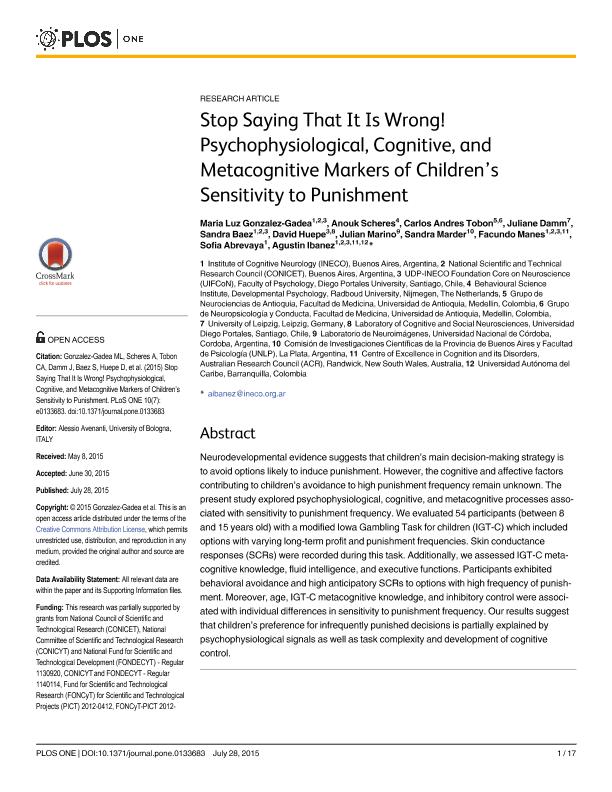Artículo
Stop Saying That It Is Wrong! Psychophysiological, Cognitive, and Metacognitive Markers of Children’s Sensitivity to Punishment
González Gadea, María Luz ; Scheres, Anouk; Tobón, Carlos Andrés; Damm, Juliane; Báez Buitrago, Sandra Jimena
; Scheres, Anouk; Tobón, Carlos Andrés; Damm, Juliane; Báez Buitrago, Sandra Jimena ; Huepe, David; Marino, Julián Carlos
; Huepe, David; Marino, Julián Carlos ; Marder, Sandra Esther; Manes, Facundo Francisco
; Marder, Sandra Esther; Manes, Facundo Francisco ; Abrevaya, Sofia
; Abrevaya, Sofia ; Ibañez, Agustin Mariano
; Ibañez, Agustin Mariano
 ; Scheres, Anouk; Tobón, Carlos Andrés; Damm, Juliane; Báez Buitrago, Sandra Jimena
; Scheres, Anouk; Tobón, Carlos Andrés; Damm, Juliane; Báez Buitrago, Sandra Jimena ; Huepe, David; Marino, Julián Carlos
; Huepe, David; Marino, Julián Carlos ; Marder, Sandra Esther; Manes, Facundo Francisco
; Marder, Sandra Esther; Manes, Facundo Francisco ; Abrevaya, Sofia
; Abrevaya, Sofia ; Ibañez, Agustin Mariano
; Ibañez, Agustin Mariano
Fecha de publicación:
07/2015
Editorial:
Public Library of Science
Revista:
Plos One
ISSN:
1932-6203
Idioma:
Inglés
Tipo de recurso:
Artículo publicado
Clasificación temática:
Resumen
Neurodevelopmental evidence suggests that children’s main decision-making strategy is to avoid options likely to induce punishment. However, the cognitive and affective factors contributing to children’s avoidance to high punishment frequency remain unknown. The present study explored psychophysiological, cognitive, and metacognitive processes associated with sensitivity to punishment frequency. We evaluated 54 participants (between 8 and 15 years old) with a modified Iowa Gambling Task for children (IGT-C) which included options with varying long-term profit and punishment frequencies. Skin conductance responses (SCRs) were recorded during this task. Additionally, we assessed IGT-C metacognitive knowledge, fluid intelligence, and executive functions. Participants exhibited behavioral avoidance and high anticipatory SCRs to options with high frequency of punishment. Moreover, age, IGT-C metacognitive knowledge, and inhibitory control were associated with individual differences in sensitivity to punishment frequency. Our results suggest that children’s preference for infrequently punished decisions is partially explained by psychophysiological signals as well as task complexity and development of cognitive control.
Palabras clave:
Punishment
,
Children
,
Psychophysiological
,
Cognitive
,
Metacognitive Processes
Archivos asociados
Licencia
Identificadores
Colecciones
Articulos(SEDE CENTRAL)
Articulos de SEDE CENTRAL
Articulos de SEDE CENTRAL
Citación
González Gadea, María Luz; Scheres, Anouk; Tobón, Carlos Andrés; Damm, Juliane; Báez Buitrago, Sandra Jimena; et al.; Stop Saying That It Is Wrong! Psychophysiological, Cognitive, and Metacognitive Markers of Children’s Sensitivity to Punishment; Public Library of Science; Plos One; 10; 7; 7-2015; 1-17; e0133683
Compartir
Altmétricas



